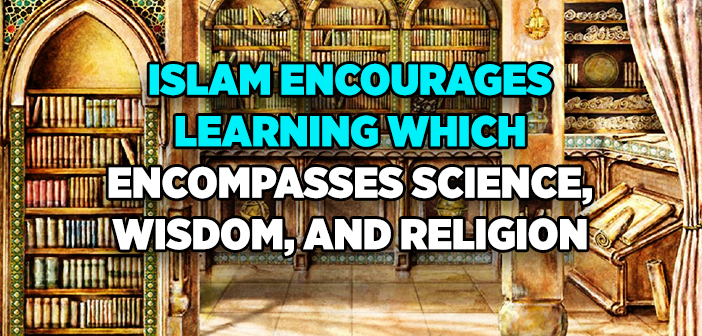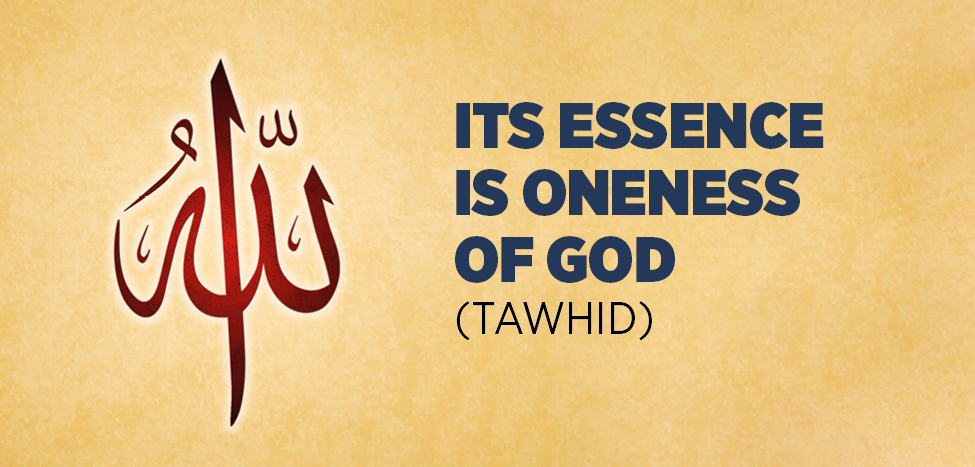Does islam promote learning involving science?
To date, there is no disagreement or conflict between Islam and science. Not only did Islam in all its history never prohibit science; on the contrary, it has very strongly encouraged it and made it obligatory for both men and women to seek learning. On the other side also, scientific discoveries never disproved the truths Islam brought; on the contrary, they continuously confirmed its teachings. Why would they disprove them? Science tries to discover the rules of beings that Allah has created by examining them. Islam is a divine religion that was revealed by Allah and was kept in its original form. Thus, the source of Islam and science is the same. As scientific discoveries are made and science developed, and as God’s grandeur, power, and the infinity of His wisdom is known better, and people’s faith in God is getting deeper. For this reason, science is an inherent part of Islam.
There many among the beautiful traditional names of Allah that express that Allah is all-knowing and how He knows everything whether it is kept secret or not. Subjects of Allah should spare no effort to get their share of that divine characteristic of knowledge. There are many hadiths and noble verses of Quran that encourage people to seek knowledge. Allah Most High says:
“Say: O my Lord! advance me in knowledge.” (Ta-Ha, 20:114)
“Allah will raise up the ranks of those of you who believe and who have been granted Knowledge.” (Al-Mujadila (The Disputer), 58:11)
Our master, the Messenger of Allah (blessings and peace be upon him) said:
“If someone enters a path with the desire to earn knowledge, Allah places that person on one of the pathways to Paradise. Since the angels are pleased with what he does they stretch their wings over him. Everything in the heavens and earth, even the fish under the water ask for forgiveness for the scholar. The superiority of scholars to worshippers is the superiority of the full moon to all the other stars. Scholars are inheritors of Prophets. Prophets do not bequeath gold and silver; they bequeath knowledge. Whoever takes this inheritance ends up taking a great bounty.” (Abu Dawud, Knowledge, 1/3641; Tirmizi, Knowledge, 19/2682. See Bukhari, Knowledge, 10; Ibn-i Majah, Muqaddimah, 17)
“Wisdom is the lost property of the believer: it is his highest privilege to take it wherever he finds it.” (Tirmizi, Knowledge, 19/2687; Ibn-i Majah, Piety, 15)
“A believer’s thirst for knowledge can never be quenched until his ultimate arrival point – Paradise.” (Tirmizi, Knowledge, 19/2686)
For this reason, Muslims embraced scientific research as worship. In 800CE, Ahmad en-Nahawandi started astronomic observations. Later on, they built great observatories. By developing the astrolabe, they measured the astronomical height of the sun, stars and other planets, cosmic time, the height of mountains, and the depth of wells. As a result of these works, the old constants were revised and new star catalogues were prepared. Many new stars were discovered, the degree of the inclination of the ecliptic was measured again, the summit movement of the sun was observed and was related with the stable stars, and other important discoveries were made related to movements of planets.
Muslims used new methods in the application of mathematics to astronomy. Instead of “continuous beams” they used trigonometry and sinus computations and were able to obtain much more precise measures. They reached an unprecedented stage in techniques related to measuring the movements of planets.[1]
Similarly, Muslims made many discoveries related to geology, mineralogy, botanic, zoology, mathematics, physics, chemistry, medicine, and pharmacy and made important contributions in the development of these sciences. Ibn-i Sina (980-1037) with his discoveries in 29 different subjects was an important scholar that paved the way for European scientists. His book on medicine called al-Kanun fi’t-tib (The Canon in Medicine) was taught in European universities for 600 years as a textbook. The first person to mention the function of the retina layer in the eye was Ibn-i Rushd (1126-1198). The work on the eye, Tazkiratu’l Kahhalin, written by Ali bin Isa (XIth century) remained the only textbook on optics for centuries and was been translated into Latin, German and French. Ammar bin Ali (XIth century) performed eye surgery nine centuries ago and explained in detail how he removed cataract in his book Al Muntakhab fi ‘Ilaji’l ayn. This book, also, was translated into the main European languages of the time. Ibn-i Haitham (Alhazen) (965-1051), an important physicist and the founder of the science of optics, invented eyeglasses. Ali bin Abbâs (994) performed cancer surgery that prefigured today’s modern surgery techniques. A medicine encyclopedia called Kitabu’l-Maliki is scrutinized with admiration even today. Ebu’l-Kâsım ez-Zehrâvî (963-1013) made surgery an independent scientific discipline, drew the pictures of around 200 tools that are used in surgery and explained for what and how they are used in his book called Tasrif. Microcirculation was discovered by Ibn al-Nafis who lived between 1210 and 1288 and explained this in detail in a commentary that he wrote on Ibn-i Sina’s Kanun. Akshemseddin (1389-1459) says the following about microbes in his book called Maddet al-hayat:
“It is wrong to think that illnesses happen to people independently. Illnesses are contagious. This spread happens due to live seeds that are so small that they cannot be seen by the human eye.”
Hârizmî (780-850), who used the number zero for the first time in mathematics, established the foundations of algebra and named it with his book called al-Jabr wa-l-Muqabala. Sons of Musa (IXth century) measured the circumference of the world with a very minor error. Beyrûnî (973-1051), who made discoveries in various disciplines, proved that the world turns around both itself and the sun, and successfully measured the diameter of the earth by the research that he conducted around the city called Nendene in India. His formula about this subject has come to be known as “the Beyruni formula” in Europe. Battani (Albategni) calculated the solar year with an error of only 24 seconds. Ismail Jawhari (950-1010) tried to fly for the first time. Ibn-i Firnas pioneered the airplane in 880. He stayed in the air for a long time and landed smoothly with the airplane that he made with bird feathers and clothing. Razi (864-925) mentioned gravity. Christopher Columbus (1446-1506) said that he learned the existence of America from Muslims, especially from the books of Ibn-i Rushd (1126-1198). Idrisi (1100-1166) drew maps eight centuries ago that were similar to today’s world maps.[2]
Throughout history in many places various civilizations have emerged, and they all helped the development of science by mutual influences and loans. Muslims too benefited from the knowledge of previous civilizations. They expressed this with humbleness and, in turn, provided important contributions to science by advancing them. The books that were written by previous civilizations were translated by the Islamic scholars but the contents were not taken indiscriminately. They were examined first and improved upon after the incorrect parts were removed.
[1] Prof. Dr. Seyyid Hüseyin Nasr, Islamic Science (Islam ve Ilim), Istanbul 1989, pp. 113-134.
[2] For sources and examples on this topic see Prof. Dr. Fuat Sezgin, Science et technique en Islam I-V, Frankfurt, 2004 (Islam’da Bilim ve Teknik I-V, Ankara 2007) and his other books; Prof. Dr. Seyyid Hüseyn Nasr, Islamic Science, An Illustrated Study, World of Islam Festival Pub. Co. Ltf., England, 1976 (Islam ve Ilim, Istanbul 1989); Dr. Sigrid Hunke, Allahs Sone über dem Abendland-Unser Arabischen Erbe, Germany 1960; Carra de Vaux, Les Penseurs de l’Islam, Paris 1923; Avicenne, Paris 1900; Prof. Dr. Mehmet Bayraktar, Islâm’da Bilim ve Teknoloji Tarihi (The History of Science and Technology in Islam), Ankara 1985; Şaban Döğen, Muslüman Ilim Öncüleri Ansiklopedisi (The Encyclopedia of Muslim Pioneers of Science), Istanbul 1987; http://www.1001inventions.com.
Source: Dr. Murat Kaya,The Final Divine Religion: ISLAM





